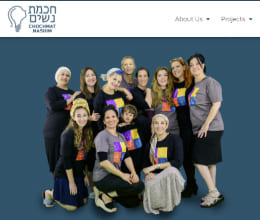The SuperBowl halftime show featured two strong, talented women. Shakira and Jennifer Lopez entertained millions of people across the world with their singing, dancing, and… gyrating.
Clearly, much thought went into the show, and both women added social and cultural messages into their acts with allusions to such hot button issues as children in cages, the status of Puerto Rico, and migrants.


Yet, no political messaging choreographed into the routine, no matter how carefully crafted, could compete with the overall visual message the video sends, namely: women are their body parts, and to appreciate them, they must be exposed.
The Bonai Olam video was created to raise funds for Jewish couples struggling with infertility. It features two well-known (in the Orthodox world) male singers singing pain filled words of longing… to be mothers. A father cooks, a boy plays, and a set of women’s hands light candles.
The men sing:
As I stand in candlelight, there’s a passion in my prayers that rends the skies, for a mother’s tears can shatter every gate that bars the way. All the heavens will echo those words that mothers say, ‘Take my children by the hand …. Give me children who’ll give nachas, vizakani, Hashem accept my plea. There is a hole inside my heart that I long to fill. Will I ever be a mother? Will that blessing come my way? Will I stand by the candles and pray…’
The scene then shifts to an all boys choir singing the “Vezakani” mother’s prayer for her children.
We see the smiling faces of fathers and sons, but no mothers or daughters. The only thing female is hands and the back of a sheitel. The song is moving, yet, no emotional messaging about women yearning to be mothers, can stand up to the glaring message it sends, namely: women are their body parts, that to appreciate them, they must be erased.
Ironically, some have used the first video to defend the second, saying, “Look how far secular culture has gone, women writhing half naked on a stage, of course we must do the opposite.”
And yet, that so-called “opposite” bears strong resemblance to the very thing it’s supposed to counter. Hiding women’s (modestly clothed) bodies from sight treats women as sexual objects, just as baring their bodies in provocative, attention-grabbing ways does. At least exposure allows the exposed women some freedom of expression; removing women from view takes their voices too.
I mean this literally. In the context of infertility, and a woman’s presumed yearning for children, she has no voice, no perspective. It is a MAN who sings what should be her line: “Will I ever be a mother?”
Orthodox Jewish videos for the general Orthodox audience rarely have women singing because of a religious injunction against women’s public singing, but to have a man sing her words adds insult to injury. “Kol Isha” could easily have been avoided while still honoring the place of women. And, as one commenter noted, “If he had changed the ‘I’s to ‘she’ I’d have less of a problem. I have a real issue of men performing women. Especially women’s pain.” Normal, modest images of women and girls are totally appropriate for a video about building a family.
Many other religious women feel the same:
“Can we talk about it being not okay for a man to sing about a woman’s pain? Multiplies erasure. Very strange.”
“I feel very much erased by frum men singing women’s stories in first person.”
“That organization is supposed to be the MOST sensitive, the MOST aware of women’s feelings. I’m…speechless.”
And perhaps, the hardest to hear:
“I’ve longed to be a mother for several years, and I don’t know if I’ll get that opportunity, but what I do know is I’d never turn to this organization for help now. They don’t see me or my pain, and this video invalidates the pain of any woman yearning to be a mother.
This Shabbat is Shabbat Shira. We will read Miriam’s song at the sea and Devorah’s song upon victory against Sisera. In the Gemara, Chana’s tefilla and song is analyzed for us to learn from as she pleads to God for children. The Torah records their songs, in their own words, because women’ voices matter.
The dichotomy of the videos above is a false one. The idea that women can only be exposed or erased is vile. It’s dehumanizing.
The censoring of all women’s images is a new phenomenon — not even a few decades old. It is not a time honored Jewish tradition, nor does it have basis in Halacha. The Torah has always championed the middle ground. We do not wear niqabs that cover our faces, and we do not walk around exposed for all to see.
Halacha provides us with rules and guidelines for this purpose. Exactly because women are meant to be part of a normal healthy society — not hidden.
Devarim 5:29 states: “Take care to do what Hashem commanded you, do not stray to the left or the right.” Yet, in our efforts to avoid the “slippery slope” on the left, we are near to falling off a cliff on the right.
We are at a crossroads. We need to decide if as a community we can find the way to respect women and their place in communal and family life, or if we are going to continue down this awful path of censoring anything feminine.
If the concerns and pain of Jewish women speaking against their erasure aren’t enough to change your mind, consider this: if our community doesn’t stop erasing Jewish women, the Shakiras and JLos of the world are the only female role models our kids are going to see.


